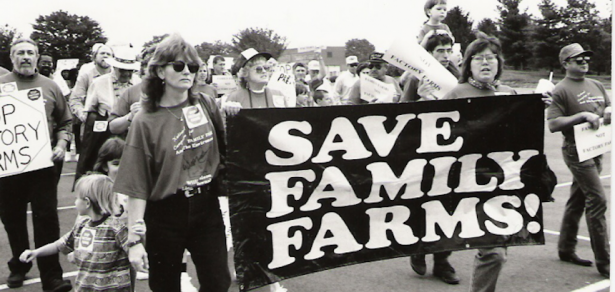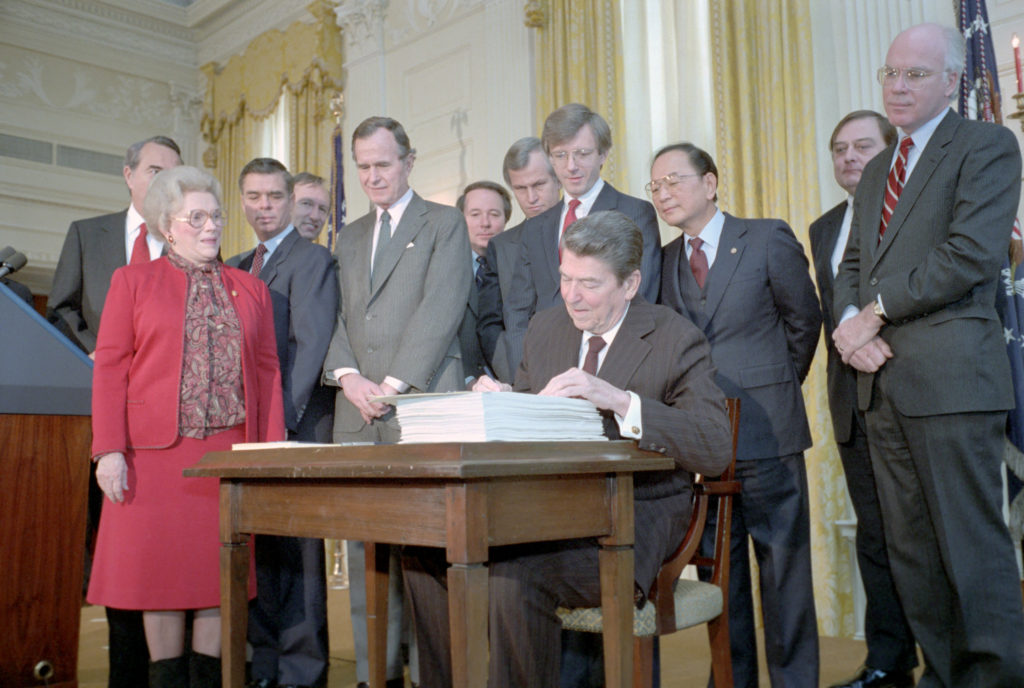
Farm Bill 1985: A Lost Opportunity
Rally to Save Family Farms
Texas Populism Project
Doug Zabel grew up on a farm in the Midwest and was a political consultant and campaign manager before he went to work with the Texas Department of Agriculture. He became closely involved with the development of the National Farm Bill of 1985.
“My dad had this little community bank that was based almost entirely on farmers. In ’81, the farm economy basically collapsed in the Midwest. It was a little later coming down here to Texas. Farm land prices dropped by 40%. Farmers were overproducing. They had big surpluses of corn, soybeans, wheat. So, it was clear we were gonna need a new farm program or some major adjustments.”
Agricultural economics, it is generally agreed, is one of the most arcane and convoluted pieces of governmental policy. If you ever have the misfortune to experience insomnia, my recommendation is to peruse a dusty book on agricultural policy. It comes with a guarantee to provide a instant, although mildly troubled, sleep.
Roosevelt’s New Deal was the first to venture into the quagmire of restructuring the farm economy. The New Deal set up a variety of policies that included supply management and price supports. Every decade and every administration since then has added a new layer of tinkering. Since the 50s, Farm Bill gets reauthorized every five years. And every five years there is a fundamental battle between the supporters of family farming and the advocates of technology and agri-business, corporate farming. The USDA, the Farm Bureau, and the Chemical Lobby and agribusiness line up for the latter.
It was Zabel’s TDA assignment to shephard the process for the 85 Farm Bill. “In 1984. Hightower became the chairman of the Democratic National Committee’s Agriculture Council, which, in the past, was basically responsible for raising some money from big Agri- Industry for the Party. But I took it seriously and…we put together a series of hearings all around the country and invited farmers to come discuss the problems. We were in the heart of the farm crisis by then. And so, we talked to farmers, all over the country and then I basically sat down with some of them and came up with a commodity program.”
Most businesses have some sort of way of managing their supply to match the demand. Most businesses except agriculture. Agriculture needs some sort of government help. Voluntary controls, mandatory controls, price supports, outright subsidies, price targets. The list is endless. Well, not endless but too long for a short blogpost. The Farm Bill supported by the TDA offered a democratic and participatory way of managing supply.
Zabel thought the proposed 1985 Farm Bill would solve a lot of problems. “it would have involved a referendum by the various farmers growing the various crops. And if they approved it, we would set a production quota basically that intended to match the anticipated demand. So you didn’t end up with surpluses piled on the ground. That sort of thing had been discussed before. But we threw in a little twist in which the smaller farmers would be required to set aside slightly less of their land. And the bigger guys with have to set aside a little more, and that was sort of slanted toward small farmers.
Essentially, the way it was set up was there would be a guaranteed floor for your crop. And so if you produce that, then you would get that amount for making your quota. If you happen to produce more than your quota, then you would store the overage and it would be applied against your quota the next year to keep things in balance.”
It seemed so simple and straightforward and fair, but there was a lot of opposition.

“It was the chemical industry and the big grain traders like Cargill Continental Grain that made their living off of shipping a lot of grain, corn, wheat, soybeans. Their margin maybe wasn’t that high but the more they shipped, the more they processed, the more they made, so they fought it tooth and nail. The chemical companies, of course, didn’t want this. It would have resulted in cutting back on chemicals by, in some cases, 30 to 35%, due to set asides. And that was in good times when the crops were good.
The American Ag movement and Farmers Union and a bunch of other commodity groups got behind the bill and and made a major push. It came up one vote short in the house Ag Committee because the Reagan administration bought off Kiki de la Garza, our South Texas Congressman who was chairman of the Committee.
I still look back now and think if we had passed the bill that rural America would look a whole lot different now. A lot of those small towns would still be around and a lot of the ones that are around would be doing a whole lot better. “